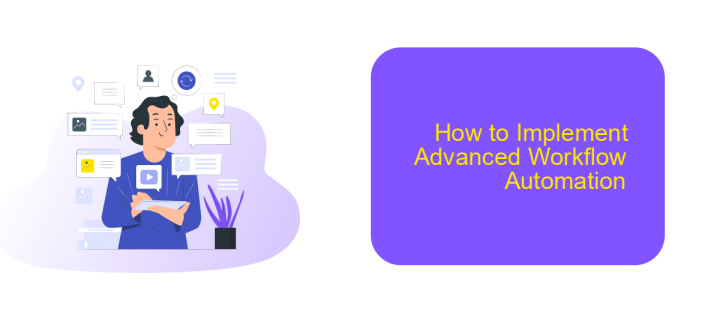Advanced Workflow Automation
In today's fast-paced business environment, advanced workflow automation has become a crucial tool for enhancing efficiency and productivity. By leveraging cutting-edge technologies, organizations can streamline complex processes, reduce human error, and free up valuable resources for more strategic tasks. This article delves into the latest advancements in workflow automation, exploring their benefits and practical applications across various industries.
Introduction
Advanced workflow automation has become a cornerstone for modern businesses aiming to enhance efficiency and reduce operational costs. By automating repetitive tasks, companies can focus on more strategic initiatives and drive innovation. This shift towards automation is not just a trend but a necessity for staying competitive in today's fast-paced market.
- Streamlining repetitive tasks
- Enhancing accuracy and reducing errors
- Improving collaboration and communication
- Enabling data-driven decision-making
One of the key aspects of advanced workflow automation is the integration of various tools and services. Platforms like ApiX-Drive facilitate seamless integration, allowing businesses to connect multiple applications without the need for extensive coding knowledge. This enables smoother data flow and ensures that all systems work in harmony, further enhancing operational efficiency. As businesses continue to adopt these technologies, the potential for growth and innovation becomes limitless.
Benefits of Advanced Workflow Automation

Advanced workflow automation offers numerous benefits that significantly enhance business operations. By automating repetitive tasks, companies can save valuable time and reduce human error, leading to increased efficiency and productivity. This allows employees to focus on more strategic activities that drive growth and innovation. Additionally, automation provides better visibility and control over workflows, ensuring that processes are consistent and compliant with industry standards.
Moreover, advanced workflow automation facilitates seamless integration with various tools and platforms. For instance, services like ApiX-Drive enable businesses to easily connect and automate workflows between different applications without requiring extensive technical knowledge. This integration capability not only streamlines operations but also enhances data accuracy and accessibility across the organization. As a result, companies can make more informed decisions based on real-time data insights, ultimately improving overall performance and competitiveness in the market.
Types of Advanced Workflow Automation Tools

Advanced workflow automation tools have revolutionized the way businesses operate by streamlining processes and enhancing productivity. These tools come in various forms, each designed to address specific needs and challenges within an organization.
- Business Process Management (BPM) Software: These tools help in modeling, automating, and optimizing business processes, ensuring that workflows are efficient and effective.
- Robotic Process Automation (RPA): RPA tools utilize software robots to automate repetitive tasks, freeing up human resources for more strategic activities.
- Integration Platforms: Tools like ApiX-Drive facilitate seamless integration between different applications, enabling data to flow smoothly across systems and enhancing overall workflow efficiency.
- Project Management Tools: These tools help teams collaborate, track progress, and manage tasks, ensuring that projects are completed on time and within budget.
By leveraging these advanced workflow automation tools, businesses can significantly reduce manual effort, minimize errors, and improve operational efficiency. Selecting the right combination of tools tailored to your organization's needs can lead to substantial productivity gains and a competitive edge in the marketplace.
How to Implement Advanced Workflow Automation

Implementing advanced workflow automation requires a strategic approach to ensure seamless integration and efficiency. Start by assessing your current processes and identifying repetitive tasks that can be automated. Understanding the specific needs of your organization is crucial for selecting the right tools and technologies.
Next, choose a reliable automation platform that can handle complex workflows. ApiX-Drive, for example, offers robust integration capabilities, allowing you to connect various applications and automate data transfer effortlessly. This platform can significantly reduce manual efforts and improve overall productivity.
- Map out your workflows and identify key automation points.
- Select the appropriate tools and platforms like ApiX-Drive for integration.
- Test the automated workflows to ensure they function correctly.
- Monitor and refine the processes for continuous improvement.
Finally, train your team on the new automated workflows to ensure smooth adoption. Continuous monitoring and optimization are essential to adapt to changing business needs and maintain efficiency. By following these steps, you can successfully implement advanced workflow automation and drive significant improvements in your operations.
Case Studies and Best Practices
One notable case study involves a leading e-commerce company that streamlined its order processing and customer service through advanced workflow automation. By integrating ApiX-Drive, they connected their CRM, email marketing, and inventory management systems seamlessly. This integration allowed real-time data synchronization, reducing manual errors and significantly improving response times. As a result, the company saw a 30% increase in customer satisfaction and a 20% boost in sales within six months.
Another best practice example comes from a healthcare provider that improved patient appointment scheduling and follow-up processes. Utilizing ApiX-Drive, they automated the integration between their patient management system and communication tools like SMS and email. This automation ensured timely reminders and updates, reducing no-show rates by 40%. The healthcare provider also reported enhanced operational efficiency and better patient engagement, demonstrating the transformative potential of advanced workflow automation.
- Automate the work of an online store or landing
- Empower through integration
- Don't spend money on programmers and integrators
- Save time by automating routine tasks
FAQ
What is Advanced Workflow Automation?
How can I implement Advanced Workflow Automation in my business?
What are the benefits of Advanced Workflow Automation?
Can I integrate different software applications using Advanced Workflow Automation?
Is Advanced Workflow Automation suitable for small businesses?
Apix-Drive will help optimize business processes, save you from a lot of routine tasks and unnecessary costs for automation, attracting additional specialists. Try setting up a free test connection with ApiX-Drive and see for yourself. Now you have to think about where to invest the freed time and money!


